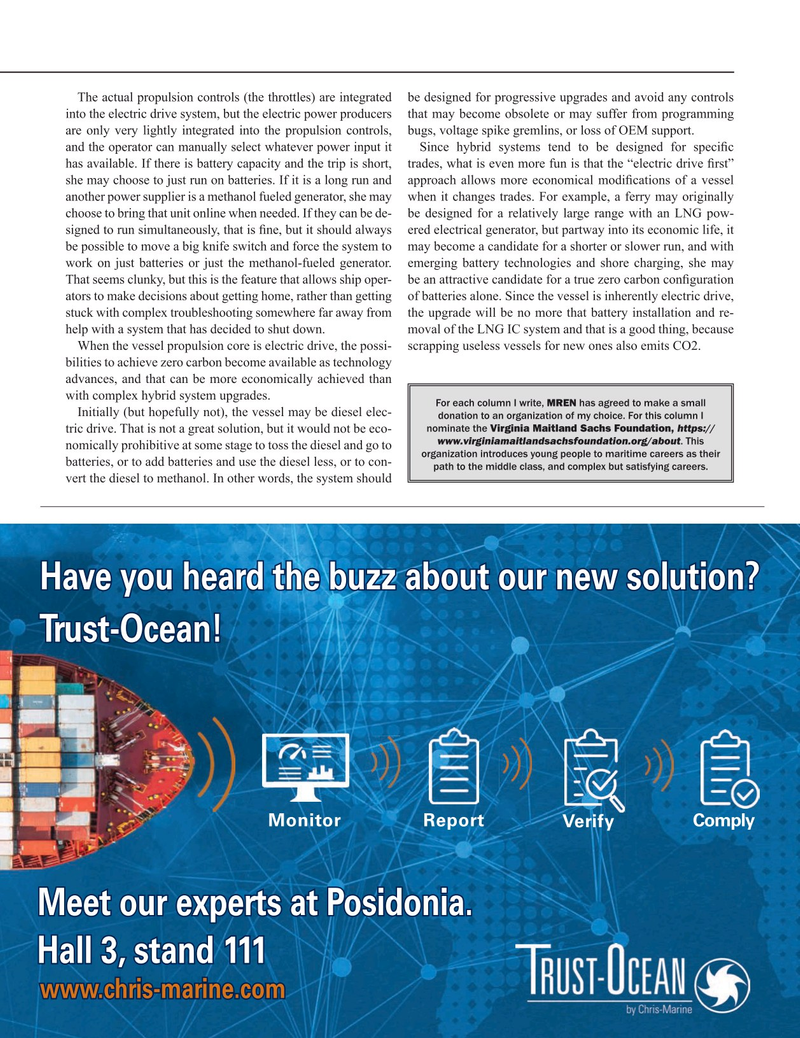
Page 11: of Maritime Reporter Magazine (May 2024)
Read this page in Pdf, Flash or Html5 edition of May 2024 Maritime Reporter Magazine
The actual propulsion controls (the throttles) are integrated be designed for progressive upgrades and avoid any controls into the electric drive system, but the electric power producers that may become obsolete or may suffer from programming are only very lightly integrated into the propulsion controls, bugs, voltage spike gremlins, or loss of OEM support.
and the operator can manually select whatever power input it Since hybrid systems tend to be designed for speci? c has available. If there is battery capacity and the trip is short, trades, what is even more fun is that the “electric drive ? rst” she may choose to just run on batteries. If it is a long run and approach allows more economical modi? cations of a vessel another power supplier is a methanol fueled generator, she may when it changes trades. For example, a ferry may originally choose to bring that unit online when needed. If they can be de- be designed for a relatively large range with an LNG pow- signed to run simultaneously, that is ? ne, but it should always ered electrical generator, but partway into its economic life, it be possible to move a big knife switch and force the system to may become a candidate for a shorter or slower run, and with work on just batteries or just the methanol-fueled generator. emerging battery technologies and shore charging, she may
That seems clunky, but this is the feature that allows ship oper- be an attractive candidate for a true zero carbon con? guration ators to make decisions about getting home, rather than getting of batteries alone. Since the vessel is inherently electric drive, stuck with complex troubleshooting somewhere far away from the upgrade will be no more that battery installation and re- help with a system that has decided to shut down. moval of the LNG IC system and that is a good thing, because
When the vessel propulsion core is electric drive, the possi- scrapping useless vessels for new ones also emits CO2.
bilities to achieve zero carbon become available as technology advances, and that can be more economically achieved than with complex hybrid system upgrades.
For each column I write, MREN has agreed to make a small
Initially (but hopefully not), the vessel may be diesel elec- donation to an organization of my choice. For this column I nominate the Virginia Maitland Sachs Foundation, https:// tric drive. That is not a great solution, but it would not be eco- www.virginiamaitlandsachsfoundation.org/about. This nomically prohibitive at some stage to toss the diesel and go to organization introduces young people to maritime careers as their batteries, or to add batteries and use the diesel less, or to con- path to the middle class, and complex but satisfying careers. vert the diesel to methanol. In other words, the system should
Have you heard the buzz about our new solution?
Trust-Ocean!
MonitorReport Verify Comply Meet our experts at Posidonia.
Hall 3, stand 111 www.chris-marine.com
MR #5 (1-17).indd 11 5/3/2024 9:49:15 AM

 10
10

 12
12
